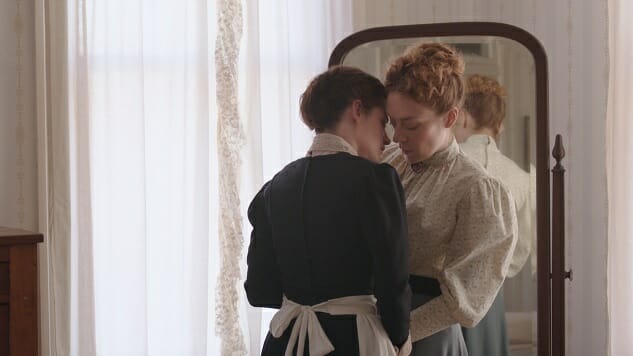
For most, if Lizzie Borden’s name takes up shelf space among other pop culture brain clutter, it’s probably thanks to the morbid skipping rope rhyme: “Lizzie Borden took an axe / And gave her mother 40 whacks / When she saw what she had done / She gave her father 41.” Not that culture has lost interest in the gallows gossip of the Borden legend; Lifetime’s one-two punch of the 2014 television film Lizzie Borden Took an Axe and its 2015 follow-up, The Lizzie Borden Chronicles, a limited series set after the Borden murders, proves viewers like a murderess as much as good old fashioned sensationalism, especially when mixed together.
Lizzie, Craig William Macneill’s take on Borden’s infamy, is no exception to the rule, though it tries its damndest to avoid sensation. This is a serious film in the sense that it takes itself too seriously and in all the wrong ways. Macneill approaches Borden through a contemporary lens: She’s a killer, no mistaking that, but she kills for survival rather than enjoyment. She’s an avenging angel out to punish her wicked father (Jamey Sheridan) for his domineering ways and for crimes of sexual abuse, as well as her stepmother (Fiona Shaw) for her complicity (and simply for being there). As modernized premises for the Borden narrative go, that actually sounds kind of awesome on paper, except that Lizzie hasn’t the inclination to embrace the campy genre quality of that synopsis, playing to respectability instead.
As so often happens when genre attempts to deny its nature, the results frustrate. Lizzie hangs on mood and atmosphere while orbiting its lead, Chloë Sevigny, playing Borden with face set in stone, carrying herself with the stiff poise of a heron. All of her effort is stored in her eyes, but it’s never enough to make the character come alive. Lizzie’s something of a socialite hopeful. She’s on the outskirts of the 1800s “in” crowd, and on the outskirts she stays by dint of Mr. Borden and his patriarchal control over his household and family. Then arrives Bridget Sullivan (Kristen Stewart), a maid newly under the Borden’s employ, saddled with the pseudonym of “Maggie” at the behest of Mrs. Borden. Light suddenly shines on Lizzie’s otherwise somber life.
History leaves many questions about Borden’s life unanswered, so Macneill augments history with rumor and hearsay. In his shoes another filmmaker might have made the same choices and interpreted the affair as a Gothic chiller, complete with grisly violence, gender oppression and a torrid romance between a lady and her maid—it’d be Park Chan-wook lite, in other words. The problem with Lizzie is that Macneill’s filmmaking rejects the idea of interpreting Borden’s infamy through a genre lens. The movie comports itself with manufactured high mindedness, indulging in the trappings of style when convenient: a softly wailing violin score here, a drawn out silence there, a shot held on Sevigny’s eerie, unreadable countenance elsewhere.
At all other times Lizzie postures with the stuffy importance of most historical biopics, and the clash between biography and thrills ends up feeling exploitative. Did Borden’s dad abuse her and Sullivan? Maybe, but we don’t know. Did they share with one another a forbidden love, at the time considered abominable? Maybe, but likely not. Did Borden actually kill her parents? Did Sullivan help her? History shrugs at these conundrums while Macneill replies to each with an enthusiastic “yes.” If Lizzie owned up to its fiction, it might have been watchable. But the closing title cards hew to truth in direct conflict with the film’s excesses and suppositions, endorsing conjecture at the expense of fact.
In fairness to Macneill, the elements he focuses on here are tantalizing, the kind of juicy details you can’t unsee for the sake of telling a more accurate story. Besides, accuracy isn’t the most significant hurdle Lizzie fails to clear. Evidential or not, it’s banal. Craftsmanship may have afforded Macneill freedom to shape fact to his will, because craft lets filmmakers open doors where there aren’t any, but Macneill drags Lizzie out, groaning and sighing, long past its welcome. The film is too self-conscious of its titillating qualities, and way too assured of its perspective on the Borden murders. It’s lost in itself, as Sevigny and Stewart are lost in their performances, Sevigny at a loss to find a center in Borden, Stewart struggling with a stock Irish accent. There’s no reason a movie where these two play star-crossed lovers should be this dull.
Director: Craig William Macneill
Writer: Bryce Kass
Starring: Chloë Sevigny, Kristen Stewart, Jamey Sheridan, Fiona Shaw
Release Date: September 14, 2018
Boston-based culture writer Andy Crump has been writing about film and television online since 2009 (and music since 2018). You can follow him on Twitter and find his collected writing at his personal blog. He is composed of roughly 65% craft beer.